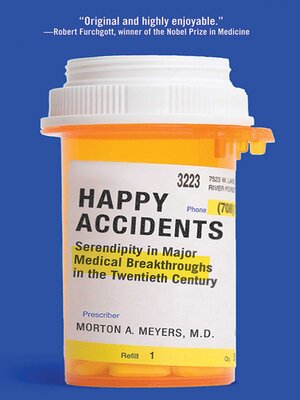Happy Accidents: Serendipity in Major Medical Breakthroughs in the Twentieth Century
ebook
By Morton A. Meyers

Sign up to save your library
With an OverDrive account, you can save your favorite libraries for at-a-glance information about availability. Find out more about OverDrive accounts.
Find this title in Libby, the library reading app by OverDrive.



Search for a digital library with this title
Title found at these libraries:
| Library Name | Distance |
|---|---|
| Loading... |
Happy Accidents is a fascinating, entertaining, and highly accessible look at the surprising role serendipity has played in some of the most important medical discoveries in the twentieth century. What do penicillin, chemotherapy drugs, X-rays, Valium, the Pap smear, and Viagra have in common? They were each discovered accidentally, stumbled upon in the search for something else. In the 1990s, Pfizer had high hopes for a new drug that would boost blood flow to the heart. As they conducted trials on angina sufferers, researchers noted a startling effect: while the drug did not affect blood flow to the heart, it did affect blood flow elsewhere! Now over six million American men have taken Viagra in their lifetime.
Winston Churchill once said, “Men occasionally stumble across the truth, but most of them pick themselves up and hurry off as if nothing has happened." Within the scientific community, a certain stigma is attached to chance discovery because it is wrongly seen as pure luck. Happy accidents certainly happen every day, but it takes intelligence, insight, and creativity to recognize a “Eureka, I found what I wasn't looking for!" moment and know what to do next. In discussing medical breakthroughs, Dr. Morton Meyers makes a cogent, highly engaging argument for a more creative, rather than purely linear, approach to science. And it may just save our lives!
Winston Churchill once said, “Men occasionally stumble across the truth, but most of them pick themselves up and hurry off as if nothing has happened." Within the scientific community, a certain stigma is attached to chance discovery because it is wrongly seen as pure luck. Happy accidents certainly happen every day, but it takes intelligence, insight, and creativity to recognize a “Eureka, I found what I wasn't looking for!" moment and know what to do next. In discussing medical breakthroughs, Dr. Morton Meyers makes a cogent, highly engaging argument for a more creative, rather than purely linear, approach to science. And it may just save our lives!







